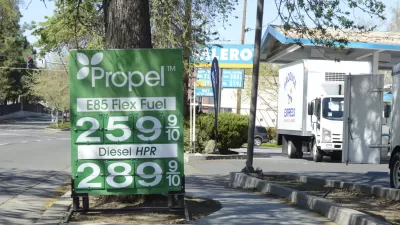Oklahoma Attorney General Scott Pruitt suggested that as administrator of the Environmental Protection Agency he might not allow California to set its own stricter motor vehicle emissions standards.
California air quality regulators have relied on "a waiver of the preemption which prohibits states from enacting emission standards for new motor vehicles," permitted by the 1970 Federal Clean Air Air due to the state's poor air quality. As a result, California requires stricter emission standards than most other states. However, the waiver is not given unconditionally — it is up to the U.S. Environmental Protection Agency to to grant it.
In response to a question posed by California's new junior U.S. senator, Kamala Harris (D), about the continuation of the waiver, EPA administrator nominee Scott Pruitt stated, "I don’t know without going through the process to determine that," reports Evan Halper for the Los Angeles Times on Pruitt's confirmation hearing held Jan. 18. "One would not want to presume the outcome," added Pruitt.
If the Trump administration did succeed in eliminating California’s waiver authority, the loss would be a major setback for the state’s environmental policies.
As Pruitt sparred with committee Democrats, California’s chief regulator of air quality and greenhouse gas emissions, Mary Nichols, was testifying in Sacramento about the importance of the waiver to her agency, the California Air Resources Board.
Denial of the waiver would not just be a setback to California's air quality and carbon reduction efforts but also the 13 other states that have adopted California's Clean Car Standards.
This would not be the first time that the waiver became the subject of a partisan dispute. In 2007, the EPA under Republican President George W. Bush denied California's request for a waiver in order to set stricter greenhouse gas emissions standards for passenger vehicles. Two years later, the waiver was granted by the EPA under the administration of Democratic President Barack Obama.
FULL STORY: Trump's EPA pick casts doubt on California's power to regulate auto emissions

Study: Maui’s Plan to Convert Vacation Rentals to Long-Term Housing Could Cause Nearly $1 Billion Economic Loss
The plan would reduce visitor accommodation by 25,% resulting in 1,900 jobs lost.

North Texas Transit Leaders Tout Benefits of TOD for Growing Region
At a summit focused on transit-oriented development, policymakers discussed how North Texas’ expanded light rail system can serve as a tool for economic growth.

Why Should We Subsidize Public Transportation?
Many public transit agencies face financial stress due to rising costs, declining fare revenue, and declining subsidies. Transit advocates must provide a strong business case for increasing public transit funding.

How Community Science Connects People, Parks, and Biodiversity
Community science engages people of all backgrounds in documenting local biodiversity, strengthening connections to nature, and contributing to global efforts like the City Nature Challenge to build a more inclusive and resilient future.

Alabama: Trump Terminates Settlements for Black Communities Harmed By Raw Sewage
Trump deemed the landmark civil rights agreement “illegal DEI and environmental justice policy.”

Dear Tesla Driver: “It’s not You, It’s Him.”
Amidst a booming bumper sticker industry, one writer offers solace to those asking, “Does this car make me look fascist?”
Urban Design for Planners 1: Software Tools
This six-course series explores essential urban design concepts using open source software and equips planners with the tools they need to participate fully in the urban design process.
Planning for Universal Design
Learn the tools for implementing Universal Design in planning regulations.
City of Santa Clarita
Ascent Environmental
Institute for Housing and Urban Development Studies (IHS)
City of Grandview
Harvard GSD Executive Education
Toledo-Lucas County Plan Commissions
Salt Lake City
NYU Wagner Graduate School of Public Service





























